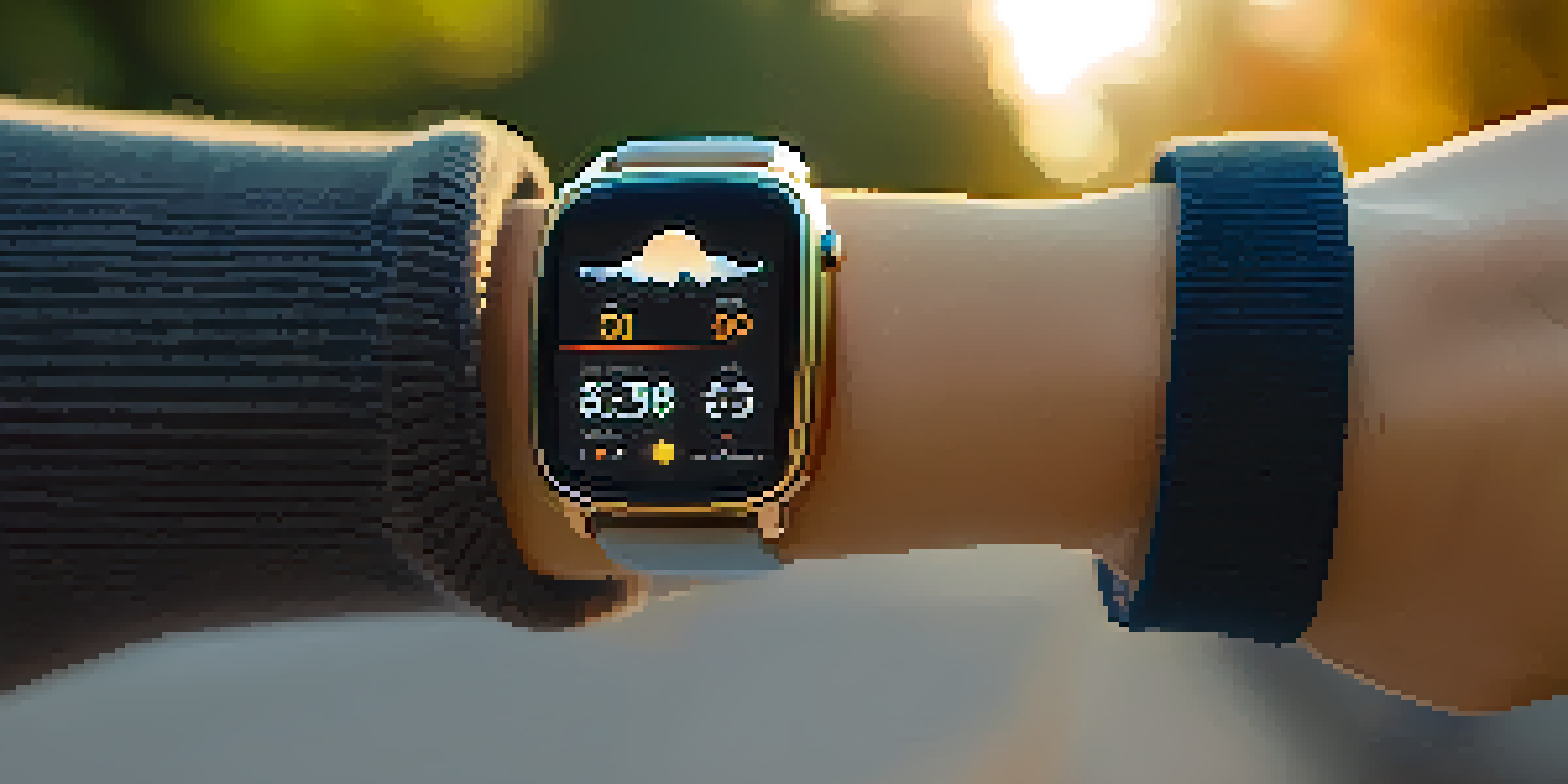The Impact of Wearable Technology on Everyday Life

Understanding Wearable Technology and Its Evolution
Wearable technology encompasses devices like smartwatches, fitness trackers, and health monitors that can be worn on the body. These gadgets have evolved significantly over the years, moving from simple pedometers to advanced devices that track a variety of health metrics. For instance, a smartwatch today can monitor heart rate, track sleep patterns, and even alert users of irregular heartbeats, all from the wrist.
Wearable technology is not just about tracking data; it's about empowering people to take charge of their health and wellness.
As technology continues to advance, wearables are becoming more sophisticated, integrating artificial intelligence and machine learning to provide personalized insights. This evolution is not just about tracking physical activity; it’s about enhancing our overall quality of life. Think of wearables as your personal health assistants, always ready to provide insights about your body’s performance.
With such rapid advancements, it's clear that wearable technology will only continue to grow and adapt to our needs. As more people embrace these devices, they are reshaping how we view health, fitness, and even daily productivity.
How Wearable Tech Enhances Health and Fitness
Many individuals have turned to wearable devices to help maintain or improve their health and fitness. For example, fitness trackers can motivate users to reach daily step goals or remind them to stay active throughout the day. This gamification of fitness makes exercise feel less like a chore and more like a fun challenge.

Moreover, wearables can provide real-time feedback on workouts, allowing users to adjust their intensity and technique to maximize results. Whether it’s tracking calories burned or monitoring heart rate zones during a run, these insights help users make informed decisions about their fitness routines. It’s like having a personal trainer on your wrist!
Wearables Boost Health Insights
Wearable devices track health metrics and provide personalized insights, acting as personal health assistants.
Additionally, for those with chronic health issues, wearables can play a vital role in monitoring conditions. They can alert users to potential health issues before they become serious, empowering individuals to take proactive steps towards better health.
Wearable Technology and Workplace Productivity
In the workplace, wearable technology is proving to be a game changer. Devices like smart glasses and health monitors can enhance efficiency by providing real-time data and analytics. For instance, a construction worker using smart glasses can access blueprints or safety protocols while keeping their hands free, which enhances both safety and productivity.
The future of health is in our hands, literally, with wearables revolutionizing the way we monitor and manage our well-being.
Moreover, wearables can help employers monitor employee well-being, ensuring they are not overworked or stressed. By analyzing biometric data, companies can create healthier work environments, leading to higher job satisfaction and productivity. Imagine a workplace where stress levels are monitored, allowing for timely interventions to improve mental health.
As remote work becomes more common, wearables also help maintain connections among teams. Devices that track activity levels can foster a sense of community, encouraging colleagues to engage in friendly fitness challenges, even from a distance.
The Role of Wearables in Mental Health Management
Wearable technology is increasingly being recognized for its role in mental health management. Devices that track physiological signals, such as heart rate variability, can provide insights into emotional well-being. For example, when a user experiences stress, their device may suggest breathing exercises or mindfulness techniques, acting as a gentle reminder to take a moment for self-care.
Additionally, apps connected to wearables can help users log their moods and identify patterns over time. This data can be invaluable for therapists and counselors who are looking to provide tailored support. Think of this as having a personal mental health journal that you can carry with you at all times.
Tech Enhances Workplace Productivity
Wearable technology improves workplace efficiency by providing real-time data and supporting employee well-being.
As stigma around mental health continues to decrease, the incorporation of wearables in everyday life can facilitate conversations about well-being. By normalizing the use of technology for mental health, we open the door to more holistic approaches to self-care.
Wearable Technology and Social Interaction
Wearable technology can also enhance social interactions in our daily lives. Many devices allow users to share their achievements, such as fitness milestones or health stats, with friends and family. This sharing fosters a sense of community and accountability, making it easier for individuals to stay committed to their goals.
Moreover, smartwatches enable users to receive notifications and messages directly on their wrists, allowing for seamless communication without needing to pull out their phones. This feature is particularly useful in social settings, where staying engaged is crucial. Imagine being able to check in with friends without interrupting the flow of conversation.
As we become more connected through wearables, the way we interact with one another is evolving. These devices can serve as conversation starters, allowing users to bond over shared goals and interests, whether it’s fitness, health, or technology.
The Future of Wearable Technology: What's Next?
Looking ahead, the future of wearable technology is exciting and full of potential. Innovations like smart clothing and advanced health sensors are already on the horizon. Imagine a shirt that monitors your heart rate and adjusts its temperature based on your activity level, keeping you comfortable throughout the day.
Additionally, the integration of wearables with smart home technology could create a more connected lifestyle. For instance, your wearable could adjust your home’s thermostat based on your body temperature or remind you to take breaks by dimming the lights in your workspace. This level of personalization could redefine convenience in our everyday lives.
Future Innovations Are Promising
The future of wearable tech includes smart clothing and home integration, enhancing convenience and personalization.
As more people adopt wearable devices, the data collected will lead to improved designs and functionalities. The key will be balancing advanced features with user privacy, ensuring individuals feel safe while benefiting from these technological advancements.
Challenges and Considerations of Wearable Tech
Despite the many benefits, wearable technology also comes with its share of challenges. Privacy concerns are at the forefront, as users may be hesitant to share personal health data with companies. It's essential for manufacturers to prioritize data security and transparency, ensuring users feel safe while using their devices.
Another consideration is the potential for over-reliance on technology. While wearables can provide valuable insights, it’s crucial for users to remember that they are tools to aid health and productivity, not replacements for professional advice or personal intuition. Balancing tech use with mindfulness and awareness is key.

Lastly, accessibility remains an issue. Not everyone can afford the latest wearables, which can create a digital divide in health and fitness tracking. Bridging this gap will be essential to ensure everyone can benefit from advancements in wearable technology.